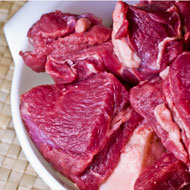Delay on non-stun ban 'unacceptable' - BVA

"This delay to act in the face of overwhelming evidence is completely unacceptable."
Delayed action to reduce the suffering of animals that are slaughtered without pre-stunning is "completely unacceptable," the BVA's president has said.
Earlier this week, a parliamentary debate was held after the BVA's petition to end non-stun slaughter reached 100,000 signatures.
Commenting on the debate, BVA president John Blackwell said it was well attended by MPs from all parties.
"It is now clear that the Government can no longer ignore the strength of feeling of MPs and the public on this issue," he insisted in a statement.
"While the Government clearly agrees with the scientific evidence that slaughter without pre-stunning allows animals to feel pain and compromises animal welfare, it has yet to take any action to reduce the suffering of the animals involved.
"This delay to act in the face of overwhelming evidence is completely unacceptable."
Mr Blackwell said many MPs at the debate agreed with the BVA's view that if the practice of non-stun slaughter is allowed to continue, clearer slaughter method labelling must be introduced.
More than 80 per cent of Halal in the UK is stunned before slaughter, however, Mr Blackwell says the percentage of non-stun slaughter is greater than the size of the UK's Muslim and Jewish populations.
"This means that some of it must be going outside of the communities for which it was intended," he explained.
"Clearer labelling will not only give consumers a choice but will help ensure the number of animals slaughtered is limited to satisfy the needs of the religious communities concerned and thereby reduce the amount of non-stun slaughter."
During the debate, MPs drew attention to a system used in Germany, whereby abattoirs must prove religious needs and state the number of animals to be slaughtered for the relevant communities, before they will be granted a licence.
MPs also suggested the option of an immediate post-cut stun, which could reduce the pain and suffering of animals that are not pre-stunned.
Whatever action the Government decides to take, Mr Blackwell says: "Inaction is now no longer a credible option."



 The Animal and Plant Health Agency (APHA) has updated its online reporting service for dead wild birds.
The Animal and Plant Health Agency (APHA) has updated its online reporting service for dead wild birds.